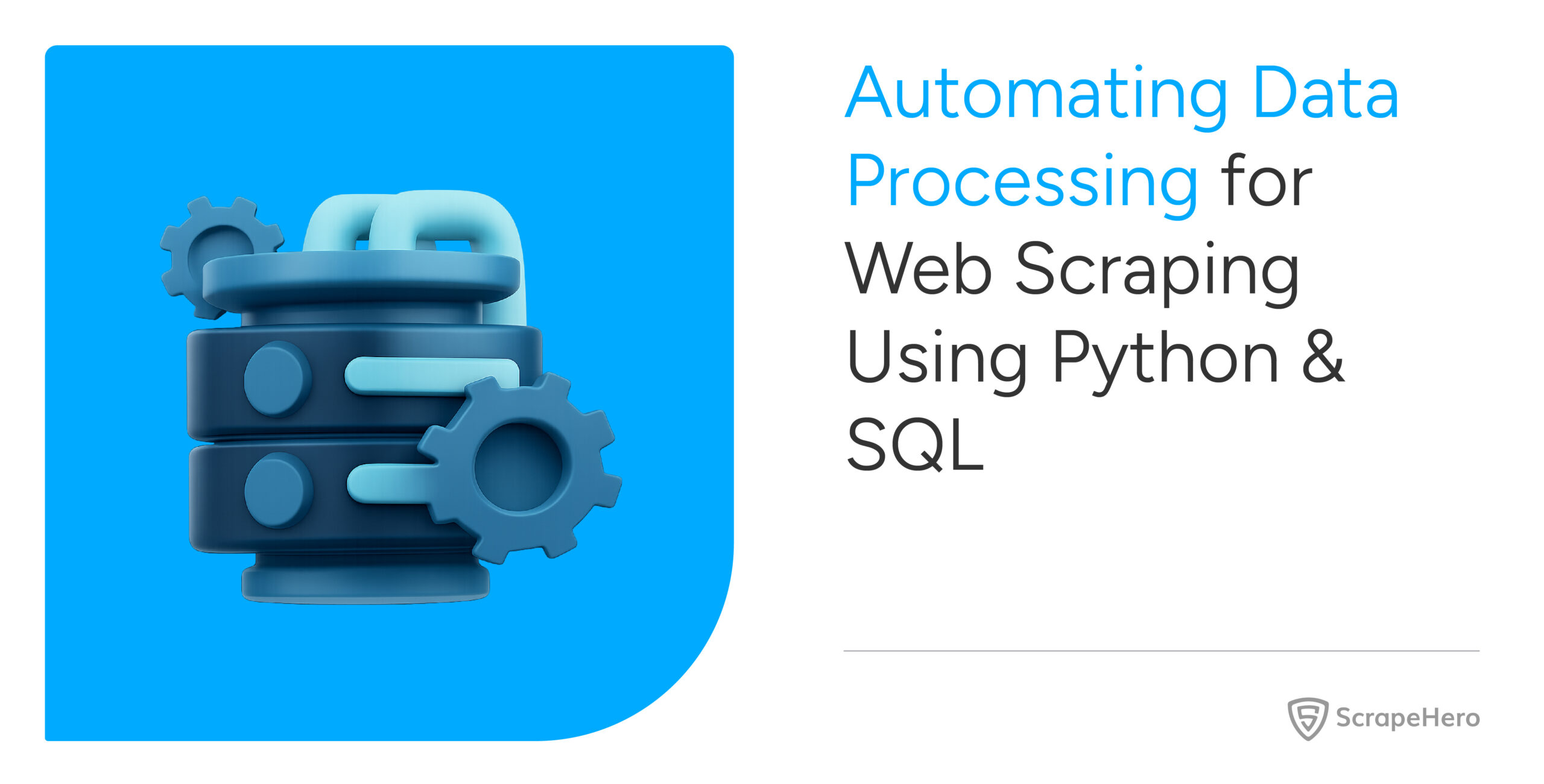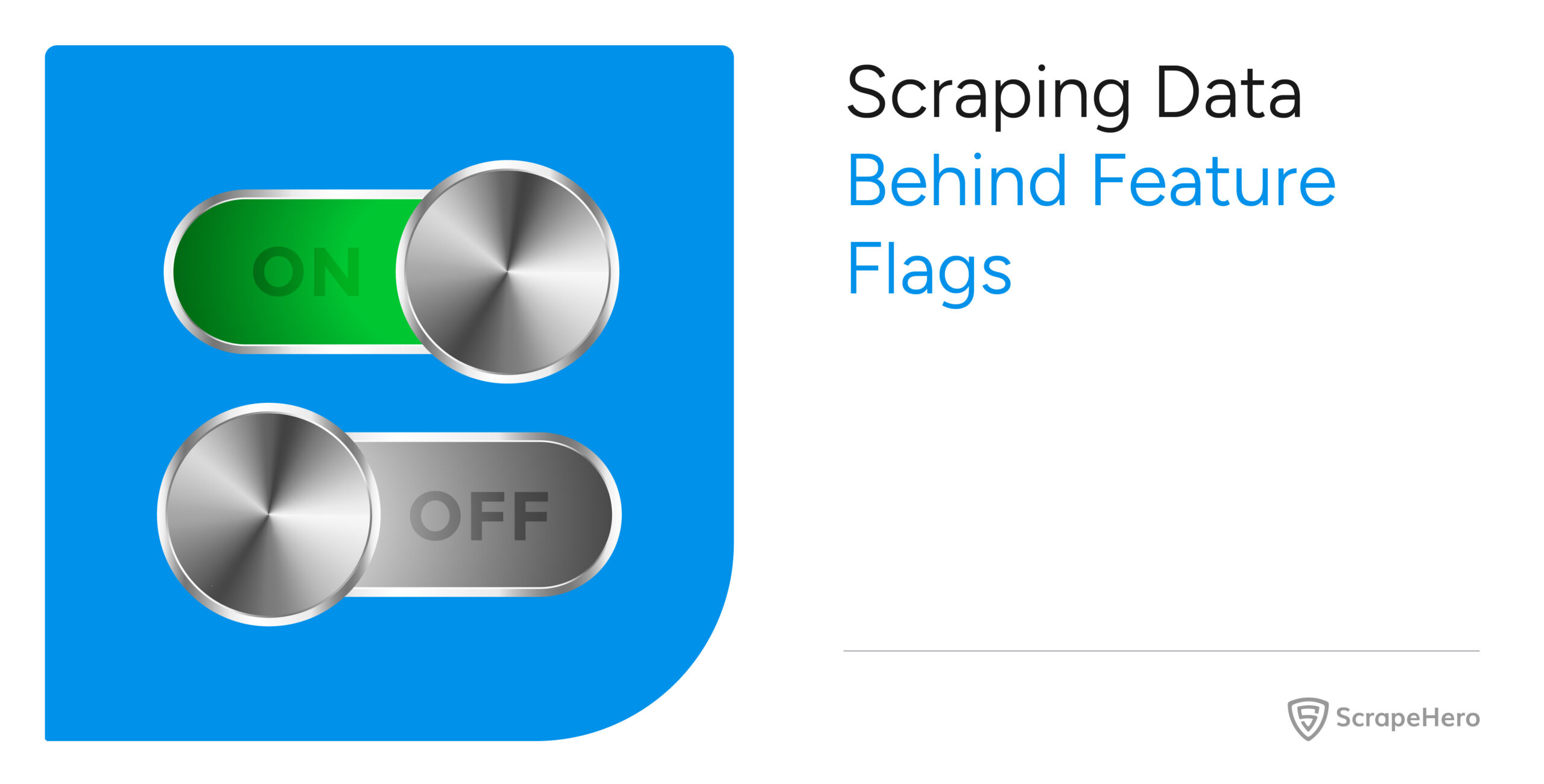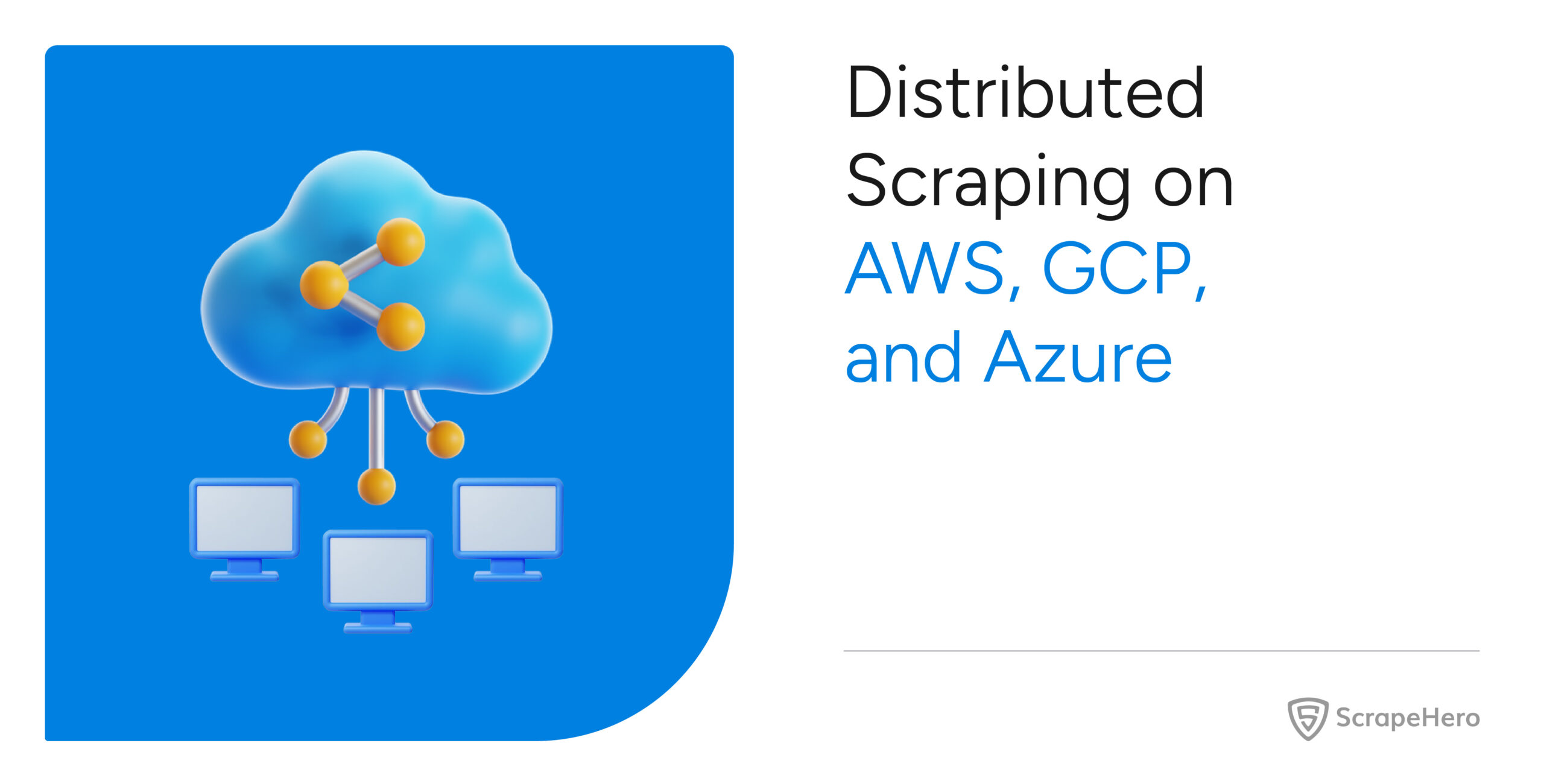Web scraping can face various challenges due to web technologies’ complexity and dynamic nature. These challenges require robust solutions that also ensure efficient and responsible data extraction.
As businesses scale their data extraction to thousands of websites, it is essential to understand these challenges. The article will shed light on various web scraping challenges and the methods used to overcome them.
Types of Web Scraping Challenges
From technical errors to legal issues, web scraping can encounter many challenges. In general, these challenges of web scraping can be categorized into three:
- Technical Web Scraping Challenges
- Legal Web Scraping Challenges
- Ethical Web Scraping Challenges
Technical Web Scraping Challenges
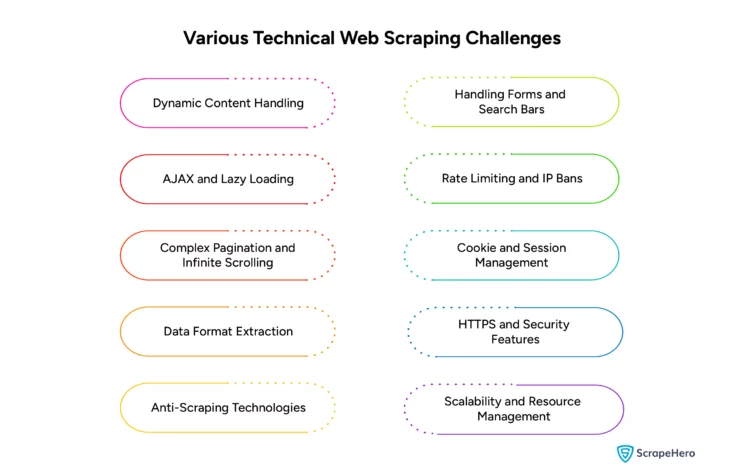
Technical challenges in web scraping are generally related to the complexities of dealing with different web technologies to maintain the efficiency of the scraping operations. Here are some specific types of technical challenges of web scraping:
-
Dynamic Content Handling
Traditional scraping tools, which parse only static HTML, cannot handle most modern websites that use JavaScript to load content dynamically. Browser automation tools like Selenium, Puppeteer, or Playwright can interpret JavaScript and fetch dynamically loaded content.
-
AJAX and Lazy Loading
One of the common challenges in web scraping is capturing data loaded asynchronously through AJAX or on-demand, especially during lazy loading when the user scrolls. A solution to this is to monitor network traffic for capturing API requests and responses. Additionally, using browser-based scraping tools to mimic scrolling actions aids in loading the content on the page, thereby ensuring comprehensive data extraction.
Also Read: How to Scrape Lazy Loading Pages -
Complex Pagination and Infinite Scrolling
Data extraction becomes particularly challenging when dealing with infinite scrolling mechanisms or complex page navigation. This issue can be effectively addressed by developing scrapers that can automatically detect and manage pagination or simulate user actions to handle infinite scrolling. Such advanced scraper development techniques are essential to overcome this complex challenge.
-
Data Format Extraction
Data extraction from different formats, such as PDFs, images, or embedded videos, can be technically challenging. Using specialized libraries like PyPDF2, Tesseract, and certain media processing tools can resolve the issue to some extent.
-
Anti-Scraping Technologies
Websites detect and block web scraping by employing methods like browser fingerprinting or behavioral pattern analysis. However, detection can be avoided only by implementing techniques such as user-agent rotation, using headless browsers, and mimicking human interaction patterns.
-
Handling Forms and Search Bars
Web scraping can become complex when interacting with forms or search bars to retrieve data based on specific queries or filters. Normally, tools that can interact with web forms and submit forms programmatically to access the data are used to solve this challenge.
-
Rate Limiting and IP Bans
When too many requests are made in a short period, IP bans or rate limiting can occur. To prevent such a crisis, following some best web scraping practices, like respecting robots.txt and using proxy servers to distribute requests are essential.
-
Cookie and Session Management
Managing cookies and sessions is another technical web scraping challenge. Many websites use cookies and sessions to manage user states, which can be a barrier to scraping. So, it is necessary to manage cookies and headers within the scraping scripts to maintain session continuity.
-
HTTPS and Security Features
Websites that use HTTPS and other security features also present additional challenges for data extraction. A scraper tool that supports HTTPS and handles SSL/TLS certificates can resolve this issue.
-
Scalability and Resource Management
Sufficient resources are required to handle large volumes of data. Cloud-based platforms like ScrapeHero Cloud, containerization, and queue management systems are some solutions for efficiently scaling web scraping operations.
Legal Web Scraping Challenges
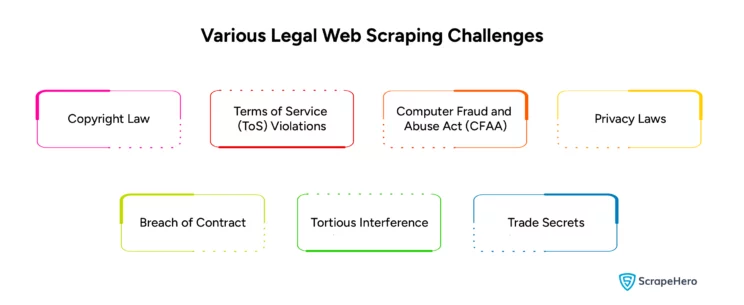
Data extraction must often navigate the complexities of laws and regulations implemented by the websites and the government. These legal challenges are crucial to conducting ethical and legally compliant scraping operations. Here are some of the legal challenges of web scraping:
-
Copyright Laws
Most website content is copyrighted. So, web scraping this copyrighted material without permission is a copyright violation. Obtaining permission from the copyright holder is essential.
-
Terms of Service (ToS) Violations
Many websites prohibit web scraping and include clauses related to it in their Terms of Service. When these terms are violated, the website owners can take legal action. So, it is advisable to always read and comply with the website’s ToS.
-
Computer Fraud and Abuse Act (CFAA)
Unauthorized access to computer systems is a criminal offense under the US Computer Fraud and Abuse Act (CFAA). Also, even if the website is publicly accessible, bypassing access control is considered a violation.
-
Privacy Laws
The California Consumer Privacy Act (CCPA) strictly prohibits personal data collection and use. So, it is essential to implement appropriate data handling and processing practices that Ensure compliance with data protection regulations.
-
Breach of Contract
A breach of contract occurs when scraping violates a contract with a website. It’s crucial to carefully consider the contractual implications of web scraping and seek to negotiate terms that allow for scraping wherever possible.
-
Tortious Interference
Web scraping can often interfere with a website’s business operations, such as overloading the servers with requests or scraping and publicly disclosing sensitive information. This can potentially lead to accusations of tortious interference, so it is necessary to avoid such scraping practices.
-
Trade Secrets
Scraping trade secrets like proprietary algorithms or business processes may lead to legal issues. Therefore, any data that could be classified as a trade secret should be avoided while scraping.
Also Read: Is web scraping legal?
Ethical Web Scraping Challenges
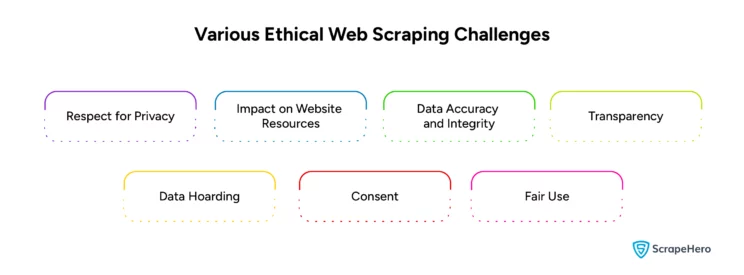
Scraping should be completely transparent and ethical. Ethical challenges in web scraping occur when scraping activities on websites are against these considerations. Some common ethical challenges of web scraping include:
-
Respect for Privacy
There is an infringement on individuals’ privacy rights when extracting personal data without consent. Only scrape data, respecting privacy, and collect personal data if necessary and legally.
-
Impact on Website Resources
Continuous web scraping slows down a website, negatively impacting visitors. So, conduct scraping during off-peak hours and use caching to minimize the server load on the website.
-
Data Accuracy and Integrity
Data extracted may need to be updated or corrected and, if handled carefully, can lead to the spread of misinformation. Regular updation of data is essential to ensure its accuracy and integrity. If possible, verify the data against multiple sources.
-
Transparency
Transparency is another ethical challenge that must be considered. In some cases, web scraping with hidden or deceptive practices often happens, leading to distrust and ethical concerns.
-
Data Hoarding
Sometimes, more data than necessary is collected, which creates ethical concerns regarding surveillance and unnecessary data retention. So, collect only the essential data and implement strict data retention policies.
-
Consent
Websites may contain publicly accessible data, but they may not be meant for large-scale web scraping. In such cases, consider the ethical implications of data collection. If the data to be collected pertains to individuals or sensitive topics, then consent is necessary.
-
Fair Use
Use the extracted data by fair means. The usage must comply with the source website and should not violate copyright laws. Avoid data usage in a way that directly undermines the source.
Strategies to Overcome Web Scraping Challenges
To overcome common web scraping problems, adopt a comprehensive approach encompassing technical, ethical, and legal strategies. The solutions implemented also differ for each category of challenges.
Technical Solutions
Effective technical solutions should be implemented for technical web scraping challenges like dynamic content management, IP block evasion, and data accuracy maintenance. Tools like Selenium, Puppeteer, and Playwright can manage dynamic websites.
Use IP rotation and proxy services to avoid IP blocks and limit rate limits. In cases of CAPTCHA challenges, reduce scraping speeds or employ CAPTCHA-solving services. Sophisticated error-handling mechanisms are essential to ensure the reliability and robustness of scraping.
Ethical Solutions
For ethical web scraping challenges, implement ethical solutions that emphasize the importance of respecting the rights of website owners and maintaining the integrity of source websites. Implementing caching techniques reduces server load and maintains a balance between data collection needs and the website’s operational integrity.
Scrapers should consider operating during off-peak hours and implementing this approach. This approach helps maintain the data being scraped. Further, it is essential to ensure transparency in web scraping, primarily when the data is for research or publication.
Legal Solutions
Legal strategies in web scraping focus on complying with relevant laws and regulations of the government and websites. To reduce legal risks, scrapers must respect websites’ terms of service. It is also important to adhere to privacy laws when handling personal data.
Adhering to regulations such as CCPA is essential. Additionally, it is important to avoid bypassing security measures like login barriers and CAPTCHAs. If possible, consult with legal experts to ensure that all scraping activities remain within legal boundaries.
How Does ScrapeHero Overcome Common Web Scraping Problems?
As a pioneer in the field of web scraping, ScrapeHero can tackle common web scraping problems. With a decade of experience in data extraction services, we implement several strategies to overcome such challenges. Advanced algorithms enhance data extraction accuracy and efficiency while scraping from complex websites.
Our crawling infrastructure can navigate anti-scraping technologies used on websites and bypass IP blocks and CAPTCHAs. It also supports large-scale web scraping operations and provides accurate data after quality checks. We offer customized solutions to meet our clients’ diverse business requirements.
Closing Thoughts
Web scraping requires technical expertise and knowledge of legal frameworks. The challenges that come with web scraping can only be solved by balancing technical capabilities with ethical and legal considerations.
ScrapeHero web scraping services can provide our clients with tailored solutions to overcome these challenges. Our comprehensive strategies allow you to maximize the potential of web data, enhancing your competitive advantage in your respective markets.
Frequently Asked Questions
The problem with data scraping is that if not handled properly, it can create legal and ethical issues, such as violating website terms of service and infringing copyright laws. Excessive scraping also leads to site overload and, hence, disruption of website services.
A common challenge in web scraping dynamic websites is effectively handling JavaScript-rendered content. Since these sites load their content asynchronously, scrapers must use tools that can execute JavaScript, like Selenium or Puppeteer.
Privacy issues with web scraping mean unauthorized collection and use of personal data. Collecting personal information without consent is illegal and can even lead to legal consequences.





